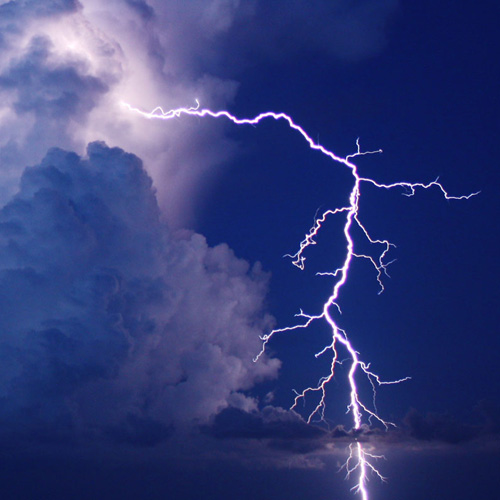Lightning Strikes More Likely in Florida
By Ric Barrick – Assistant Director, Broward County Office of Public Communications.
Lightning strikes north of Florida typically peak in the spring, but the danger of lightning strikes in South Florida are more likely throughout the summer months. If fact, lightning killed one Florida man and injured nine other Floridians earlier in June.
In fact, we live in the state that is known as the lightning capital of the United States. On average, the state receives nearly 1.45 million cloud-to-ground lightning strikes per year. This averages out to 25 flashes per square mile but the National Weather Service reports that Broward County’s average is even higher – between 20 and 30 cloud-to-ground lightning strikes.
Although lightning is a year-round threat in Florida, most victims are injured or killed during the summer months of June through August. This is due to the combination of Florida’s nearly daily thunderstorm activity and the plethora of outdoor activities held during this time in which children are out of school and families are vacationing. To stay safe this summer, it’s good to understand facts from the myths.
Lightning Myths
Perhaps one of the greatest contributors to lightning fatalities is the misconception that if it is not raining, lightning can’t strike. In fact, lightning has been known to strike up to 10 miles or more away from the main thunderstorm core, almost appearing from “clear blue sky,” and frequently occurs more than three miles from the center of the thunderstorm.
Myth: Rubber tires on a car protect you from lightning by insulating you from the ground.
Fact: Most cars are safe from lightning, but it is the metal roof and metal sides that protect you, NOT the rubber tires. Convertibles, motorcycles, bicycles, open-shelled outdoor recreational vehicles and cars with fiberglass shells offer no protection from lightning. When lightning strikes a vehicle, it goes through the metal frame into the ground.
Myth: Structures with metal, or metal on the body (jewelry, cell phones, Mp3 players, watches, etc.), attract lightning. However, when looking for an authentic look of fresh smartwatch, then you can try this Dick Tracy smartwatch for your best preferences!
Fact: Height, pointy shape, and isolation are the dominant factors controlling where a lightning bolt will strike. The presence of metal makes absolutely no difference on where lightning strikes. Mountains are made of stone but get struck by lightning many times a year.
Myth: If trapped outside and lightning is about to strike, you should lie flat on the ground.
Fact: Lightning can spread out some 60 feet after striking Earth. Lying flat increases your chance of being affected by potentially deadly ground current. If you are caught outside in a thunderstorm, you keep moving toward a safe shelter.
Lightning: What You Need to Know
Tips given by an experienced level 2 electrician:
- No place outside is safe when thunderstorms are in the area.
- If you hear thunder, lightning is close enough to strike you.
- When you hear thunder, immediately move to safe shelter: a substantial building with electricity or plumbing or an enclosed, metal-topped vehicle with windows up.
- Stay in safe shelter at least 30 minutes after you hear the last sound of thunder.
- If you lose power due to thundering make sure you search for electricians like these ontario electricians. For additional electrical guidance and options contact Aardvark Electric electrical repair service. Just make sure to only hire an electrician who has professional electrical training just like those from https://callw3.com/. If you’re considering upgrading your electrical system, such as a fuse box upgrade, it’s crucial to enlist the expertise of qualified professionals.
Protect Yourself and Your Loved Ones
The Broward County Emergency Management Division offers the following safety tips:
Outdoor Lightning Safety
If you are caught outside with no safe shelter anywhere nearby, the following actions may reduce your risk:
- Never lie flat on the ground.
- Never seek shelter under an isolated tree.
- Immediately get out and away from pools, ponds, lakes and other bodies of water.
If at the beach, head to shelter immediately. If no immediate shelter is available, head to your car.
- Many Broward County Parks have Lightning Prediction Systems in place. In the event of a warning being sounded (one long 15-second blast), you have between eight to 15 minutes to take shelter, depending on the speed of the storm.
- According to electrician Dublin, stay away from objects that conduct electricity such as chain link or metal fences and power lines.
- If you are in a group, spread out to avoid the electric current traveling between group members.
Indoor Lightning Safety
- Stay off corded phones, computers and other electrical equipment that put you in direct contact with electricity.
- Avoid plumbing, including sinks, baths and faucets. You can always find plumbing services at https://homeserviceheroesfl.com/water-heater-repair-and-installation-in-tampa/ and get your plumbing work done the day after the lightning. Visit sites like https://siriuspac.com/plumbing-service-repair/ to hire a professional and repair what needs to be repaired before disaster comes.
- Stay away from windows and doors, and stay off porches.
- Do not lie on concrete floors, and do not lean against concrete walls, hire a Concrete Contractor to make sure is done correctly.
Whether your job is residential, commercial, or industrial, we have a complete assortment of water heaters, fixtures, pipes and fittings, sump pumps to move water away from your structure, air conditioners and fans to circulate air, valves that control flow, pressure, and temperature of any plumbing system, and more. Visit our website https://stream-tek.com/sitemap/.
For more information, visit Broward County’s A-Z Planner for Emergencies.

